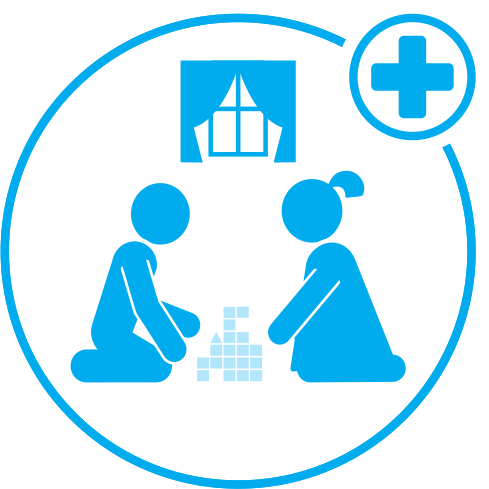An Introduction to ADHD – Attention-Deficit / Hyperactivity Disorder
You may have heard the term attention-deficit/hyperactivity disorder, or ADHD. Maybe you have wondered what it is or what to do if you suspect your child shows symptoms.
First of all, it is important to know that ADHD is common among children. The percent of children with an ADHD diagnosis has changed over time and measurements can vary. The American Psychiatric Association states in the Diagnostic and Statistical Manual of Mental Disorders (DSM-5, 2013) that 5% of children may meet criteria for an ADHD diagnosis. Additionally, according to the National Survey of Children’s Health (2016), 9.4% of children between the ages of 2 and 17 have been diagnosed with ADHD. So, if your child is exhibiting symptoms or has been diagnosed with ADHD, you are not alone.
It is also important to note that most children grow out of ADHD, but for some, the symptoms can continue into adulthood. The behaviors that mark the disorder — namely having a limited attention span (inattentiveness) and / or being unusually active or impulsive (hyperactivity) — can occur in very young children, though in most cases the signs and symptoms become apparent when children reach school age.
ADHD is not a developmental disorder like autism but is a brain disorder influenced by a variety of factors including genetics, exposure to toxins during pregnancy and low birth weight. Medication is often appropriate to treat ADHD but is not always the only option available to treat the disorder. Behavioral therapy – with or without medication – may be helpful in eliminating symptoms that are significantly interfering with a child’s daily life functions and ability to adapt to different situations.
With behavioral therapy, which is based on principles of applied behavior analysis or ABA, a child can be taught new or different behaviors to replace problematic ones. Part of the appeal of behavioral therapy is that the benefits of modified, learned behavior can continue into adulthood, so the child is not just experiencing a better childhood, but is learning behaviors and skills that can last for a lifetime.
There are three types of ADHD:
- Predominantly Inattentive Presentation. Common signs and symptoms include frequent daydreaming, lack of focus or poor concentration, making careless mistakes in schoolwork, not listening when spoken to directly, or being easily distracted or forgetful.
- Predominantly Hyperactive Presentation. Common signs and symptoms include impulsive behavior, moving constantly with an intention to distract others, inability to stay seated when sitting still is expected, talking excessively when quiet is preferred, lack of patience and interrupting others.
- Combined Presentation. Common signs and symptoms include a mix of the above. For example, one minute the child is daydreaming and cannot focus and the next minute the child is getting up and out of his or her seat.
All children have moments of inattentiveness and hyperactivity. It is only a problem when the symptoms impair every day functions, with the child having difficulty regulating and shifting behaviors to perform basic and necessary daily activities.
If you have observed inattentiveness and hyperactivity in your child that seems to be excessive, it is worth exploring further to determine if ADHD may be the underlying cause. Your first step is to discuss the situation and your observations with your child’s primary care physician or pediatrician, or with a psychologist or psychiatrist. These healthcare professionals may offer a referral to a specialist for an evaluation.
Evaluating a child for ADHD involves administering a battery of assessment tools used to evaluate thinking, reasoning and remembering (cognitive functions), as well as assessment tools used to evaluate functions of the nervous system (neurological functions). These tests are combined with interviews with caregivers and teachers and observation in a clinic or at school. The evaluation process, when conducted by a trained professional, is friendly and non-threatening.
Receiving a referral for an evaluation does not necessarily mean your child has ADHD. In many cases the evaluation will not indicate attention-deficit/hyperactivity disorder. But if there is a diagnosis of ADHD, a good clinician will help you identify an appropriate course of action and treatment that will help address the problem behaviors and that ensures your child is treated with care and compassion.
Learn more about our evaluation & diagnostic services or ABA-based behavioral therapy services available through 360 Behavioral Health.
About the Author
Dr. Lindsay Wray, a Licensed Clinical Psychologist (PSY 30954), received her Doctor of Psychology in Clinical Forensic Psychology from the Chicago School of Professional Psychology. She is a member of the diagnostic team at Willowbrooks Behavioral Health – a preferred provider for 360 Behavioral Health –where she conducts comprehensive psychological evaluations with children and adolescents facing a wide range of challenges. Dr. Wray is also a 4th Year Fellow at the Reiss Davis Child Study Center, a department of Vista Del Mar Child and Family Services, where she conducts comprehensive psychological and psychoeducational evaluations with children and adolescents. In January of 2019, Dr. Wray joined the Reiss Davis Graduate Center as an adjunct professor, teaching psychological assessment and dissertation courses in the Psy.D. program. Dr. Wray’s interest in the field of psychology and psychological assessment is driven by her desire to work with and improve the lives of vulnerable and underserved populations.
Licensed Clinical Psychologist
Willowbrooks Behavioral Health
Evaluation and diagnostics – also known as psychodiagnostics – is the first step necessary to diagnose and clarify concerns regarding behavior, personality traits, mood, emotional functioning,
and cognitive processes.
Applied Behavior Analysis, or ABA, refers to a variety of treatment options that are based on the principles of behavior analysis. ABA uses scientifically-based techniques for understanding and changing behavior, and is the most widely accepted approach to assess and intervene with individuals with autism spectrum disorder (ASD) or other developmental challenges or delays.
















